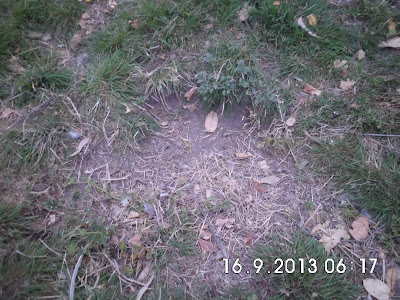This wasn't an idle day.
- Started the pumps on the dam to maintain a steady supply of water in order to finish giving all the fruit trees a drink.
- Put on a 10 litre batch of yogurt
- Moved the 14 sprinklers twice and finishing off with just three by nightfall. Wound up all the hoses and put away the spray units
- Made up the sugar/water mix for the bees and placed the feeder in the hive
- The parmesan that was made the day before came out of the press and placed in a brine solution
- Harvested some more ripe coffee berries, popped out the pips and put them in a bowl of water to ferment off the remaining pulp. Spent some time husking some more of the dried coffee beans
- Finished mulching the last of the foliage from the trees felled the other week and used the mulch around various trees. Four big barrow loads in this last lot.
- Made three trips across the river to move the irrigator and conducted some running repairs on said irrigator, moved the cattle and silage feeder
- Fed our cattle some hay
- Refuelled our dam pumps and gave then another run
- Picked Mulberries and Mandarin for tonight's dessert
- Picked and shelled a batch of Broad Beans for Bruschetta (with Garlic and oil)
- Got down to the pool for a few laps. The schedule called for 26 laps i.e. increase by two each day until we reach 40 or one kilometre. The pool manager changed the plan and we did 30 laps. 3 x 100 metres every 2 minutes 30, 5 x 50 metres on one minute 15, 6 x 25 metres on 40 seconds, finishing with one lap on 30 seconds and a final lap on 25 seconds. Will sleep well tonight.
- And this was a fast day with the only food being a big milky latte at 5.30 am
Stuff just has to get done or it builds up in the background and the pile becomes insurmountable. What choice do you have? Pack it all in and live in an apartment and eat take away? Cut down on the made here items? What would you give up, the wine, the vegetables, the chooks, the cheese, the fruit, the outdoor life, the maintenance?
At no point did I feel like dragging the chipper/mulcher down to the pile of foliage but it had to be done and the incentive was it would be the last pile.
Dragging hoses about setting up sprinklers just had to be done or the trees would suffer and possibly shed blossoms and potential food would be lost.
Going without food all day wasn't too bad except around those times which may be construed as meal times or when the parmesan came out of the press and needed a little trimming. The trimmings went to the dogs - only just. But fasting a couple of days in each seven seems to be very good for the body's IGF-1. At the very least we have both experienced a slight weight loss over the four months. About 5%. We still eat a comprehensive evening meal on fast days. It seems that it is the average calorie intake over seven days that has gone down. The change in waist line is noticed as clothing that was a bit tight is not so any longer.
Going to the pool on a fast day is not a very attractive endeavour but exercising when not eating forces the body to use up more of that body fat reserve accumulated over the years. It really was hard to get down there but with a training partner (who was not fasting) encouraging me to greater heights it went quickly enough and after a while it's not all that bad especially when you get down to the last few laps.
So tonight we had a great meal starting with our creamy Blue cheese using slices of carrot instead of bread or biscuits. Then the Broad Bean bruschetta. Followed by a selection of dishes from Yotam Ottolenghi's book Plenty. Pretty much vegetarian fair today but all fresh from the garden and tasty.
And celebrated the day with an extra glass or two of wine.
What happened to the motivation for moderation?

















































